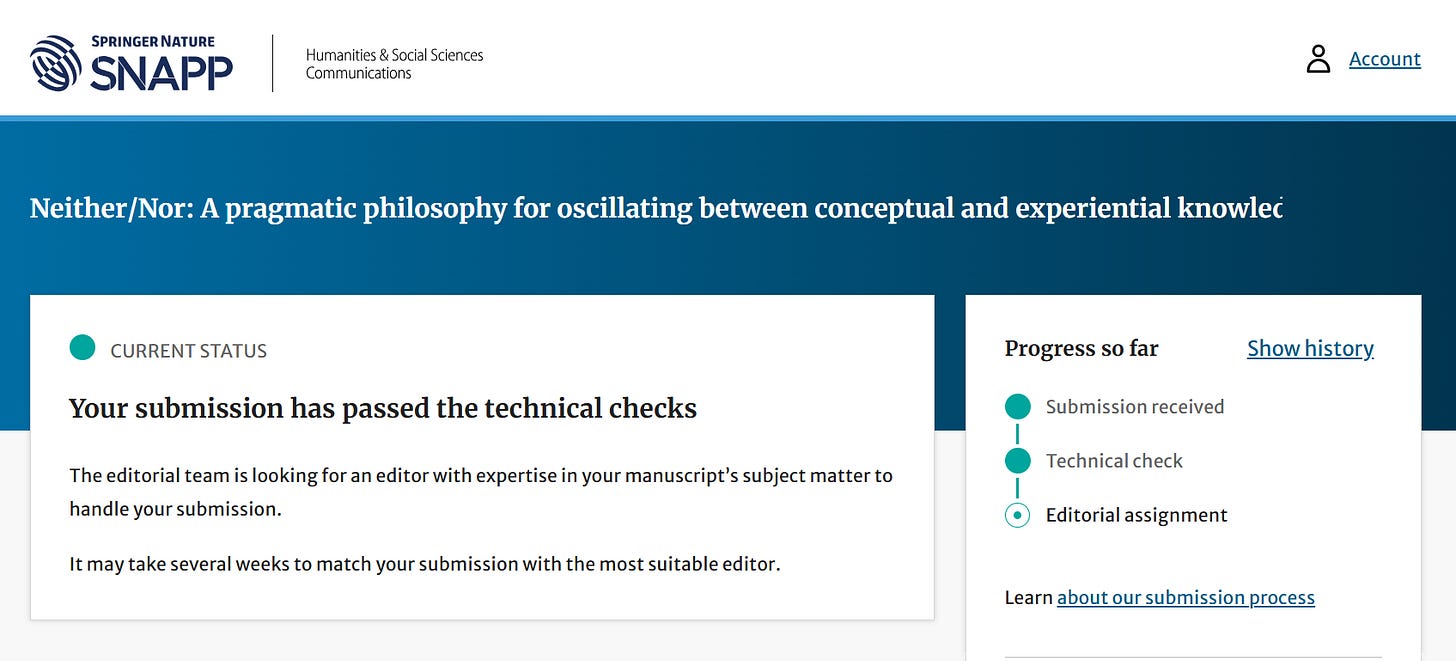Technically Checked ✅
Neither/Nor article has passed the technical checks
I’m Bryan Kam. I endeavour daily to make philosophy accessible and relevant. To that end I write this newsletter and host a podcast called Clerestory. I’m also writing a book called Neither/Nor and I’m a founding member of Liminal Learning. In London, I host a book club, a writing group, and other events. My work looks at how abstract concepts relate to embodied life, and how to use this understanding to transform experience.
Good news! The Neither/Nor article has not yet been rejected. But first, a rant about life without a laptop.
Laptopless Life
There's a certain irony in writing about the intersection of abstract concepts and embodied experience while being deprived of one of my primary tools of thought. My recent philosophical endeavours have been hampered by my lack of access to a laptop. Philosophy demands not just reading and contemplation, but also the ability to capture, connect, and refine ideas — a process that, for me, has become deeply intertwined with digital tools like my Zettelkasten. And while a laptop may not seem the most embodied tool, being without it has felt, to me, like a physical disability.
My past month has become an unasked-for exercise in my ability to remain philosophical. I wish I could say that this limitation had itself become the starting point for philosophical inquiry: How dependent is my thought on particular technologies? What changes when the medium shifts? What are the affordances of different ways of inscribing thinking patterns? But mostly I’ve been impatiently waiting. I have some vague recollection that Heidegger and Merleau-Ponty refused to use typewriters because they felt that handwriting connected the mind more directly to the ideas than did typing. I would look it up, but I don’t have my laptop.
I’ve been able to read, of course, but the absence of my usual digital workspace has altered how I process and connect ideas—a tangible reminder of how much my thinking depends on tools.

I have my work laptop, which runs Windows but has a low resolution and I don’t really want to use it for personal stuff. I do also have a Linux desktop machine, now really a glorified server and video player connected to my TV, which I use to watch films. At one point it had been reasonably high-end, but I thought it had felt a bit slow lately. When I looked up the processor, I found that I last upgraded it thirteen years ago. No wonder it’s not fun to work on.
My laptop, a Lenovo IdeaPad Pro 5, which runs Linux, died a few weeks ago. I suspect there’s something wrong with the motherboard. After enduring the engineer’s usual barrage of questions and unlikely-to-work steps, he asked me to ship the laptop back to Lenovo. I was not super excited about this prospect as I had paid for “on-site” support, which I’ve previously used with success to replace a broken keyboard. But I thought they’d repair it within a day or two, and I’d have the laptop back within a week, or at worst the following week.
In fact, I shipped off to Lenovo on 22nd April. They inspected the laptop quickly and ordered a part, which did not arrive until 12th May. The week since then been an ongoing saga with very little information coming back from Lenovo. I’ve daily chased the premium care team, the customer care team, and the shadowy “escalation team,” all to no avail. They ignore most of my emails. They do respond to calls, chat sessions and Twitter DMs, but they end each conversation by saying that they’ll get back to me by email within a few hours. 80% of the time I hear nothing after that, and 20% of the time I receive an email which says that they’re looking into it and will give me an update “soon.”
This has meant a month without a machine that has the ability to run a decent operating system (I find both Windows and Mac unusable) and a decent web browser (sadly my home Linux machine is too slow for me to work properly on it).
How has this affected my ability to do philosophy? It has more-or-less stopped it, partly because throughout most of the wait I’d assumed I would get the laptop back within the next day or two. Had I known from the start that this was not happening, I might have switched more quickly to index cards or bought an interim machine. Instead, I’ve mostly stopped working.
Liminal Learning
That is not to say that nothing has happened, however. During this liminal period for my philosophy, I’ve had some great conversations about Liminal Learning, the practical counterpoint to Neither/Nor’s theoretical position. We are quite proud of the one-pager we made to describe the programme. We’re now fundraising; if you or anyone you know would like to support our work, please see more information here.
The article
The academic article, which I wrote about here, has now passed technical checks. I understand this to mean that they have been able to open the article, that they have found the authors, and that it’s passed AI checks for required ethical and data availability statements. The next step, “editorial assignment,” can apparently take a few weeks. I think this is the first stage at which a human will have to read the paper. I remain hopeful.
If you have yet to read the pre-print of this article, and would like to do so, you can request a copy here.
Some films I’ve seen
When I mentioned my film TV, I thought about writing today’s Substack about films I’ve seen lately. I decided not to do that, but here are some recent highlights of the films I’ve seen this year, and also how I rated them out of 10:
Loulou (1980) — 8.7
Midnight Run (1988) — 8.1
Peking Opera Blues (1986) — 9.1
Wild Reeds (1994) — 9.4
McQueen (2018) — 7.8
Love Me Tonight (1932) — 7.6
Strange Darling (2023) — 7.7
Dersu Uzala (1975) — 9.2
Woman in a Dressing Gown (1957) — 8.6
Fallen Leaves (2023) — 7.8
Civil War (2024) — 9.3
The Adults (2023) — 8.4
The Witch (2015) — 9.2
So despite being theoretically disconnected, I’ve continued to have experiences, in film, in conversation, and otherwise. Once I’ve sorted my tools, I’ll write you something better.
And if you’d like to help me get a new laptop, please consider supporting me on Patreon or Ko-Fi.
Best,
Bryan



Sounds incredibly frustrating to be without a laptop. But I’m impressed with your very finely calibrated film ratings - I think I’d need a spreadsheet to rank them with such precision!